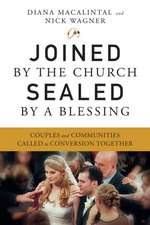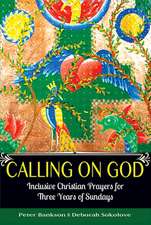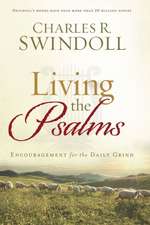Heaven Help Us
Autor Alice La Plante, Clare La Planteen Limba Engleză Paperback – 31 oct 1999
Come around
Something's lost and can't be found
It's three A.M. and you're wide awake. Worrying. You may seek solace in snacking, or in a late-night call to your best friend. The problem is, even your closest friends need to sleep, and, let's face it, the snacking only adds to the worries.
Where's a worrier to turn? To the patron saints, that's who. According to centuries-old tradition, a host of heavenly helpers is standing by, ready and eager to take a personal interest in you. Heaven Help Us shows you how to take your petitions straight to the top--to the martyrs and holy men and women who can intercede according to their particular areas of expertise:
--Is true love eluding you? Light a candle to St. Anne on a Tuesday night
--Are you suffering from a sore throat? Bake bread for St. Blaise
--Is your wallet feeling light? Donate coins to St. Expiditus
Categorized by anxiety for easy reference, and filled with lively biographies of dozens of saints as well as step-by-step instructions for performing the long-established rituals to enlist their aid, Heaven Help Us has the remedies to cure all your modern-day woes.
Preț: 87.68 lei
Nou
16.78€ • 17.55$ • 13.94£
Carte disponibilă
Livrare economică 13-27 martie
Specificații
ISBN-10: 0440508657
Pagini: 212
Dimensiuni: 114 x 192 x 15 mm
Greutate: 0.26 kg
Editura: Dell Publishing Company
Extras
We (the authors of this book) are sisters. Two women who come from a family of worriers. A large Catholic family of worriers. Relying on the patron saints as antidotes to this worry was bred into us from the moment of the first emergency-room visit to that first . . . whatever. Saint Jude? Patron of hopeless causes? You were certainly needed (and often called upon).
And say we lost something. A younger sibling, let's say. We used Saint Antony, just as others relied on more traditional lost and found departments or bureaus of missing persons. Along with the title of our first cars, we were given Saint Christopher medals for our visors--even though that saint had long been dethroned. And like everyone else who grew up in Chicago, we knew Saint Joseph was the most reliable Realtor you could employ.
Despite all this, we realized recently--as we took on more adult responsibilities of jobs, families, homes--that our repertoire of patron saint rituals and prayers (the things we could actually do or say) was worryingly small.
True, hundreds of books on saints exist. Biographies, children's books, dictionaries, theological tomes. But although many of these books contain indexes listing the various patron saints--and some even include prayers--none offer a truly practical guide. Yes, you might be able to find that Saint Lucy is the patron saint of eye ailments--that's useful. But none will tell you what you can do or say to get the intercessionary help. Not that we doubt that Saint Joseph or Anne will listen to and act upon a heartfelt plea, but rituals are calming in and of themselves. Chants, repetitive prayers, ceremonies--humans have created and used these over the centuries for good reason.
So we decided to write a book that would be the indispensable reference guide for worriers such as ourselves. To offer a compilation of saint folklore and tradition for those irrational terrors that are terrible precisely because logic is too puny a weapon to use against them.
And here's an interesting footnote: Our first title was The Insomniac's Guide to the Patron Saints, for the simple reason that we happened to do our most intense worrying in the wee hours of the morning. However, when our agent told us that she, too, worried, but was a dedicated somniac, we decided to give our project an equal opportunity title. Worriers of the world, unite!
Over the course of several years we collected rituals and prayers from all over the country--and all over the world. Prayers and rituals that have been around for centuries. Time tested. Robust. Created from the real-life struggles of real people throughout the ages.
Read on. See for yourself.
What Is a Saint, Anyway? (And Why Would You Ask One to Help You?)
It's not as simple a question as you might think.
In our secular vocabulary, the word "saint" has come to mean an exceptionally good person. We often call people "saints" as a way of showing our respect and admiration. There is also often the implication that the person has undergone significant hardship--either in the pursuit of doing good or as the result of coping with a difficult situation. Consult your thesaurus and you'll find such synonyms as "sufferer," "martyr", "scapegoat", and "victim".
Still, using the word to describe a living person is, strictly speaking, incorrect. Only the deceased can legitimately be called saints. And here's a little-understood point: Officially, according to Roman Catholic theology, a saint is any soul who resides in heaven. To put it plainly, that's anyone who has died and who has not gone to hell. Souls in purgatory (in Latin, that's literally "the place of purging") are guaranteed to eventually become saints--as soon as they suffer enough to be considered purified of all earthly sins.
So all souls in heaven are saints. Yet to use the title of "Saint" before someone's name (as in Saint John or Saint Elizabeth) is another matter altogether. That's reserved for an elite group of heavenly residents.
The American Heritage Dictionary of the English Language defines a saint as a "person officially recognized by the Roman Catholic Church and certain other Christian churches as being entitled to public veneration."
Of course, sainthood wasn't always officially sanctioned. From the beginning of time as we know it the faithful have flocked to the extraordinary faithful, wanting to follow them, live as they did, even be buried by their graves.
In fact, saints used to be created by popular consensus. Saints were those people who had earned the respect and admiration of their local communities and who were honored after their deaths by the people who knew them best. But this way of creating saints began to get out of hand in the Middle Ages when the numbers of those designated saints by the faithful grew to unmanageable proportions. The Church finally stepped in--to add objectivity and to prevent saints from being adored (adoration is due to God alone).
The Church soon decreed that only it could decide who was worthy of being called saint. Still, the large majority of saints, and indeed many of the best known, were designated in the Church's first century before the official Vatican canonization process began around the year 200.
Perhaps because there were so many first-century saints made popular by consensus, without any official "fact-finding" committees appointed or formal criteria to fulfill, much of saints history turns out to be a fascinating mixture of fact and legend. There were few, if any, written records. As this book will show, the facts of the lives of the saints have often been blurred by the needs, passions, and politics of the times in which they lived. Also, prior pagan beliefs and legends became inextricably mixed with Christian theology as it slowly spread across the globe.
That is why a large number of so-called saints were . . . let's say unseated . . . by the Catholic Church in 1969. Church officials decided there was little evidence (or, in some cases, none at all) that the saints in question had ever existed. For impressionable young Catholics, this was a traumatic time. The very popular Saint Christopher was among the saints exposed as fraudulent. Historically the patron saint of wayfarers, he is now used to ensure safe journeys by car. (Check for yourself how many cars still have Saint Christopher medals hanging from rearview mirrors or Saint Christopher statues attached to dashboards, despite the fact that Saint Christopher has officially been declared sanctus non grata.)
So who are the official saints? Martyrs are automatic saints. (The Church used to distinguish between "red" martyrs--those who actually died for their faith--and "white"--those who merely suffered.) Otherwise a saint needs an impressive dossier (to be checked over carefully by the Vatican's Congregation for the Causes for Saints) and at least two miracles (to be attributed to that individual after his or her death). Mary is the chief saint. Angels (such as Gabriel) are also saints.
There's an important distinction to be made here: Catholics don't pray to saints, they pray with them. And, of course, you don't need to be Catholic to enlist their help: saints are defined less by the religious beliefs of those in need than by the fact that a supplicant requires aid.
Saints exist who have a specific interest in you. Any saint who has been honored on your birthday. Any saint who shares your name. Patron saints are also active on your behalf according to country, ethnicity, and vocation. And saints specialize in human dilemmas. They can help you find your lost glasses, your dream house, your soul mate. They can be invoked against illness, pests, and twitching.
So saints are our heavenly helpers. They assist us in our careers, in our personal endeavors, and especially in our struggles. Each day of the calendar year has at least one patron saint. Some have several (a saint's feast day is usually the day he or she died). New saints are constantly being "made." The current Pope, John Paul II, has streamlined the process by reducing the number of miracles required from four to two and getting rid of the "Devil's Advocate," someone the Vatican appoints to find holes in the saint's case. He's also canonized over two hundred saints and beatified (the first step on the sainthood journey) over seven hundred--more than any other pope in history.
We're moving back toward the original notion of saints as local beacons of spiritual strength, as people who lived lives that were ordinary in many ways. Many of the new saints being made today are not known beyond their small village or geographic region. Perhaps most significantly, this reminds us that someone doesn't have to be famous or powerful to qualify for sainthood. That saints don't have to make the cover of People or win a prestigious humanitarian award.
So the tradition of appealing to the saints for help with everyday problems has come full circle. We're increasingly reminded that they actually lived--often in nonsaintly ways--here on earth. That they suffered the slings and arrows of outrageous fortune (sometimes literally) just as we do. That we should think of them as trusted friends or family members--all right, so maybe a very intense friend or family member--but still, the kind of people we'd feel comfortable calling at 3 00 a.m. for comfort, knowing we'll always get good advice and that we'll never be belittled for our fears.
Saint Catherine of Alexandria is one of our favorites. How could you not love someone so strong-willed, feisty, yet compassionate? Women call upon her when looking for a soul mate.
Catherine was a fourth-century pagan Egyptian princess (daughter of the emperor Costus), beautiful, intelligent--and outspoken. She succeeded to the throne at age fourteen, and her subjects urged her to marry. But she was particular. First, she refused the hand of the Roman emperor Maxentius because she did not love him. Then, she let it be known that her groom must possess four essential traits: He must be so nobly born that all would worship him; so great that he would not be indebted to her for being made king; so beautiful that angels should desire to look upon him; and so benevolent as to forgive all who offended him.
This narrowed her choice considerably. Legend says the Virgin Mary appeared to a local hermit, suggesting Jesus Christ as Catherine's suitor. Catherine considered it, but then dreamed that Christ rejected her, saying, "She's not fair enough." Catherine understood this as a sign, and converted to Christianity. That very night Mary visited Catherine in a dream, along with Jesus, who this time was favorably disposed toward Catherine. In the vision, they were married. When Catherine awoke, she wore a wedding ring, but one that only she could see.
Maxentius, still hot on her trail, tried to humble Catherine by pitting her against fifty pagan philosophers in a grand faith-debate extravaganza. She won what was for her the ultimate prize: She converted every one of them. Maxentius killed all the newly converted philosophers but still had hopes for a tryst with Catherine. When she rejected him once more, she was beaten and tied to a wheel. (This is the origin of the "Catherine wheel" later found in the dungeons of the more sophisticated religious torturers.) Not only did angels miraculously appear and destroy the wheel, but Catherine managed to convert the two hundred soldiers who were guarding her.
Maxentius responded to her industriousness by beheading every one of the soldiers. He also lopped off Catherine's head. But instead of blood, milk--the symbol of fertility, nutrition, and healing--flowed from her head and torso. She was carried by angels to Mount Sinai, where Saint Catherine's Monastery is now located. After her death, the mark of a wedding ring is said to have appeared on her finger.
Catherine posthumously was made a Doctor of the Catholic Church because of her knowledge. Since she was also a mystical bride of Christ, she is the patron saint for women seeking mates. Her steadfast--and ultimately fatal--devotion to her faith made her the prototype for a special category of saints, "the virgin martyrs," each of whom rejected some man's hand because of personal or religious scruples, and paid dearly for it.
Here's What You Can Say:
A husband, Saint Catherine,
A good one, Saint Catherine,
A handsome one, Saint Catherine,
A rich one, Saint Catherine,
And soon, Saint Catherine!
And Here's What You Can Do:
You need to get your hands on a lock of the hair of the person you want to marry. Okay, so it's the middle of the night and he's in Boise, you're in Delaware. Go ahead, sketch it. An approximation will do fine. Put the lock under your pillow while saying one of the prayers included here. Sleep on it for three nights straight. Lighting a candle is also recommended before you say your prayer--but don't forget to blow it out before you fall asleep. According to folklore, if Catherine grants your request, you will be married to the owner of the hair by the next Saint Catherine's Day (November 25). Supplicant, beware! Obtain the lock of hair by means that won't get you arrested.
Bonus Ritual!
(This prayer can be used interchangeably with the preceding.)
Sweet Saint Catherine,
send me a husband,
A good one, I pray,
But anyone better than none.
O Saint Catherine, lend me thine aid,
That I may not die an old maid.
Odd Saint Fact:
Saint Catherine's Monastery has survived unmolested despite the political and religious turmoil of the surrounding region--which is currently Israel--by a reported direct command of the prophet Mohammed.
Saint Catherine of Alexandria (Feast Day: November 25) is also patroness of lawyers, librarians, nurses, and schoolgirls. She can be invoked against diseases of the tongue.
Textul de pe ultima copertă
Lost your keys, your sunglasses (or perhaps your honor)?
Dear St. Anthony
Come around
Something's lost and can't be found
It's three A.M. and you're wide awake. Worrying. You may seek solace in snacking, or in a late-night call to your best friend. The problem is, even your closest friends need to sleep, and, let's face it, the snacking only adds to the worries.
Where's a worrier to turn? To the patron saints, that's who. According to centuries-old tradition, a host of heavenly helpers is standing by, ready and eager to take a personal interest in you. Heaven Help Us shows you how to take your petitions straight to the top -- to the martyrs and holy men and women who can intercede according to their particular areas of expertise:
-- Is true love eluding you? Light a candle to St. Anne on a Tuesday night
-- Are you suffering from a sore throat? Bake bread for St. Blaise
-- Is your wallet feeling light? Donate coins to St. Expiditus
Categorized by anxiety for easy reference, and filled with lively biographies of dozens of saints as well as step-by-step instructions for performing the long-established rituals to enlist their aid, Heaven Help Us has the remedies to cure all your modern-day woes.
















